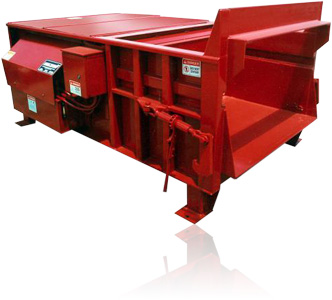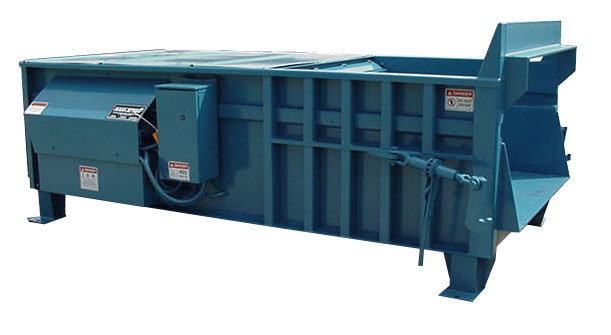How Commercial trash compactor equipment integrates with waste management strategies
Wiki Article
How Waste Equipment Boosts Effectiveness in Garbage Disposal Procedures
Waste Equipment plays a crucial role in boosting the efficiency of garbage disposal procedures. By utilizing innovative sensors and automation, these systems improve compaction cycles and monitor load capabilities properly. This integration not just preserves energy however also minimizes pick-up frequency and connected costs. As organizations progressively take on these technologies, the effects for functional sustainability and administration techniques become clearer. What various other benefits might emerge from these improvements in waste Equipment?The Function of Advanced Sensors in Compaction Performance
Advanced sensors play a necessary duty in boosting the performance of garbage compactor. These sophisticated tools keep an eye on various parameters, consisting of load ability, wetness degrees, and compaction cycles, enabling for real-time modifications. By precisely assessing the quantity of waste, sensors enable compactors to maximize their operation, making certain that energy intake is lessened while making best use of the volume of waste processed.Advanced sensing units add to predictive upkeep by determining possible problems before they lead to Equipment failing. This positive method not just decreases downtime but likewise extends the life-span of the compactor. Additionally, information gathered from these sensors can be examined to improve functional approaches, causing improved waste monitoring methods. Generally, the combination of innovative sensors in garbage disposal substantially improves their efficiency and functional performance, equating into expense financial savings and a much more lasting technique to squander disposal.
Resilience and Design: Products That Matter
The sturdiness and layout of garbage compactor hinge considerably on the products made use of in their building and construction. High-quality steel is frequently the main option, supplying toughness and resistance to tear and put on. This durable product stands up to the enormous pressure put in during compaction, making sure durability and dependability. Furthermore, components such as hydraulic systems are usually crafted from corrosion-resistant alloys to stop degradation with time, improving operational performance.Layout also plays an important role in functionality; calculated supports and ergonomic forms can substantially affect efficiency. Suppliers often focus on modular layouts, permitting simpler repair and maintenance. Additionally, innovations in coating technologies, such as powder covering, boost resistance to ecological factors, including moisture and chemicals. Inevitably, the cautious choice of materials not just boosts the structural integrity of trash compactors but likewise adds to their general effectiveness and effectiveness in waste management operations.
Automation and Smart Technology in Waste Equipment

In addition, automated compactors can maximize compaction cycles based on the quantity of waste, optimizing area and enhancing operational efficiency. Integration with mobile applications enables users to keep track of and manage compactors from remote places, boosting benefit and responsiveness. By embracing these technologies, waste management business can not only enhance their operational operations but also add to more sustainable methods by reducing waste and optimizing resource use. Overall, automation and clever innovation represent a significant leap ahead in the performance of garbage compactor operations.
Information Analytics for Maximizing Waste Monitoring
Taking advantage of data analytics supplies waste monitoring business a powerful device for boosting and maximizing operations performance. By accumulating and assessing data from different resources, such as compactor efficiency metrics and waste generation patterns, business can obtain useful understandings. These understandings enable them to make informed choices regarding collection routines, compactor use, and maintenance needs.Furthermore, predictive analytics can forecast waste generation trends, permitting firms to allot sources better and stay clear of potential overflows or underutilizations of Equipment. Real-time monitoring through information analytics likewise boosts the capacity to respond swiftly to operational difficulties, lowering downtime and enhancing service integrity.
Additionally, integrating data analytics with existing waste administration systems fosters a culture of constant improvement. By tracking and determining inadequacies performance with time, business can improve their procedures and take on finest methods, eventually causing a more lasting and efficient waste monitoring strategy.
Cost Cost Savings Through Improved Operational Performance
By lessening and simplifying procedures waste, firms can attain significant expense financial savings in their waste administration procedures. go to these guys Boosted functional performance in garbage compactors lowers the frequency of pick-ups, leading to reduced transportation costs. Advanced waste Equipment enables for maximum compaction, taking full advantage of container ability and minimizing the demand for added bins.This increased effectiveness not just reduces waste disposal fees however additionally extends the lifespan of Equipment, minimizing upkeep costs. Automated monitoring systems supply real-time data, allowing for aggressive modifications in waste handling, which can furthermore improve performance and decrease unintended expenses.
Additionally, durable training programs for personnel on my site Equipment use can cause enhanced functional practices, better driving down expenses. Inevitably, the assimilation of efficient waste Equipment promotes a cost-effective waste monitoring technique that profits business economically while making sure smoother procedures.
Environmental Influence: A Lasting Method to Waste Administration

In addition, executing reusing initiatives alongside compaction procedures allows companies to divert materials from land fills, advertising round economic climate concepts. Organizations that take on environmentally pleasant techniques not only enhance their business obligation but also interest progressively eco-conscious customers. By prioritizing sustainability in waste management, companies can achieve a twin benefit: improving operational efficiency while actively adding to environmental conservation. This well balanced approach positions services as leaders in sustainable practices, cultivating a much healthier planet for future generations.
Regularly Asked Inquiries
How Commonly Should Waste Equipment Be Maintained for Optimal Efficiency?
The frequency of maintenance for waste Equipment generally depends upon usage and producer recommendations - this post Industrial waste compaction equipment. Generally, examinations should take place quarterly, with thorough servicing every year to assure peak efficiency and avoid prospective breakdowns or inefficienciesWhat Kinds Of Waste Can Be Refined in Garbage Compactors?
Garbage disposal can process different kinds of waste, consisting of cardboard, paper, plastics, and non-hazardous food waste. Users should stay clear of compacting harmful products, steels, and liquids to ensure secure and reliable procedure.Exist Safety And Security Functions in Modern Garbage Compactors?
Modern garbage compactor commonly include safety and security functions such as automated shut-off mechanisms, emergency situation stop buttons, and sensing unit systems (Industrial waste compaction equipment). These enhancements are made to shield individuals from prospective threats during operation, advertising a safer working settingHow Does Waste Equipment Influence Labor Requirements?
The impact of waste Equipment on labor requirements is considerable; it often lowers the requirement for manual work, enhancing processes and enhancing performance. Less workers are needed, enabling companies to allocate resources extra efficiently.What Is the Ordinary Life-span of a Garbage Compactor?
The ordinary lifespan of a garbage compactor generally varies between 10 to 15 years, depending on use, upkeep, and environmental variables. Regular servicing can prolong this life expectancy, making certain perfect performance and dependability throughout its functional years.By embracing these technologies, waste management business can not only improve their operational operations yet also contribute to more sustainable techniques by decreasing waste and enhancing resource use. By lessening and streamlining procedures waste, business can accomplish significant cost savings in their waste administration procedures. Lasting waste management methods, especially in trash compactor operations, contribute considerably to reducing garbage dump waste and lowering carbon impacts. Modern waste Equipment is made to optimize compaction, thus decreasing the quantity of waste needing disposal. Garbage compactors can process different kinds of waste, including cardboard, paper, plastics, and non-hazardous food waste.
Report this wiki page